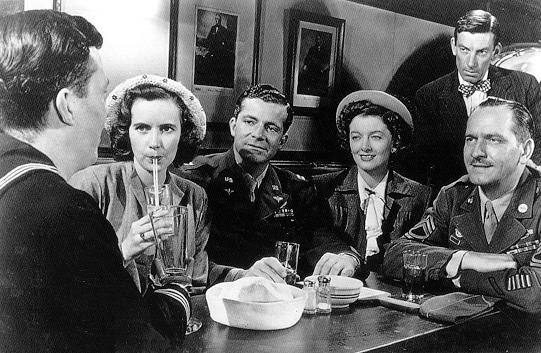I Know Where I’m Going
Posted on December 13, 2002 at 5:17 am
Plot: As a baby, as a five year old, as a school girl, and as a young woman, Joan Webster (Wendy Hiller) always knows exactly what she wants. And whether it is “real silk stockings” instead of synthetic or dinner in an elegant restaurant instead of an evening at the movies, she insists on getting it. As the movie begins, she tells her father she is about to marry one of the richest men in England, and that she is leaving that night for his island off the coast of Scotland. At each step of the trip, one of her fiancé’s employees is there to make sure things go smoothly, but once she gets to Scotland the fog is so thick she cannot take the boat to the island. That night she wishes for a wind to blow away the fog, and the next morning she finds that she has been too successful — the wind is so strong that no boats can get to the island. Stuck where she is, she meets some of the people from the community, including Torquil MacNeil (Roger Livesey), a Naval officer home on leave.
“People are very poor around here,” she comments to Catriona, a local woman who is a close friend of Torquil’s. “Not poor, they just haven’t got any money.” “Same thing.” “No, it isn’t.” While waiting for the wind to die down, Joan has a chance to see something of the life she would have as the wife of Sir Robert Bellinger. She meets his bridge- playing friends and hears of his plans to install a swimming pool on the Kiloran estate he is renting. (It turns out that he is renting it from Torquil, who is the Laird of Kiloran.) She visits a castle where Torquil’s ancestors lived, and where it is said that any Laird of Kiloran who goes inside will be cursed. She goes to the 60th wedding anniversary party of a local couple, still very much in love.
Even though it is still not safe to take the boats out, she is desperate to leave, telling Torquil, “I’m not safe here…I’m on the brink of losing everything I’ve ever wanted since I could want anything.” She pays a young man to take her out in the boat, and Torquil goes along. The boat almost sinks, and she loses the bridal gown she had planned to be married in. When it is finally safe to go, Joan and Torquil say goodbye. He asks her to have the bagpipes play for him some day, and she asks him for a kiss. They part, but she returns with three bagpipe players and joins him in the castle, where it turns out the curse provides that any Laird of Kiloran who enters will never leave it a free man. “He shall be chained to a woman until the end of his days and he shall die in his chains.”
Discussion: Like “I Love You Again,” this movie falls into the category of “the life I didn’t know I wanted.” Joan thinks she knows what she wants and where she is going, but she is given the gift of a chance to see the alternatives. She learns that, while the people from the community miss having money, there are other things they care about more. And she learns that she can fall in love with someone who is is going in a very different direction from her ideas of “where I’m going.”
This movie provides a good starting point for a discussion of how we make decisions about what we want out of life, how we pursue those goals, and what we do when we are presented either with obstacles or with new information. And it is a good starting point for a discussion of what is important, and how we determine what is important to us.
Questions for Kids:
· The title of this movie is taken from a famous old folk song. Why did the filmmakers choose it? Why did they insist on an exclamation point at the end?
· Does Joan know where she is going? When does she know? Where is she going?
· What makes Joan change her mind? What do you think her life will be like?
· What is the meaning of the “terrible curse”?
Connections: The little girl who seems so much more mature than her parents is played by then-child actress Petula Clark, who became a pop star in the 1960s (“Downtown”) and appeared in the musical version of “Goodbye Mr. Chips.”
Activities: The bagpipe plays an important role in this movie. Children might enjoy hearing more bagpipe music, especially if they can see it performed live. Look up the Hebrides, where this movie takes place, in an atlas or encyclopedia. Find out if your area has any legends like the ones described in the movie.

